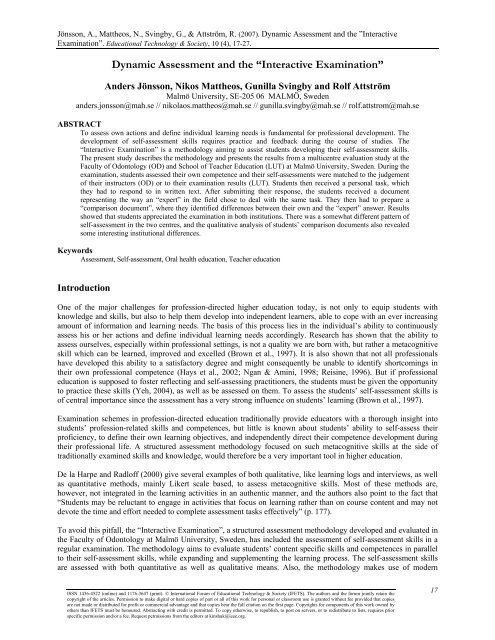October 2007 Volume 10 Number 4 - Educational Technology ...
October 2007 Volume 10 Number 4 - Educational Technology ...
October 2007 Volume 10 Number 4 - Educational Technology ...
Create successful ePaper yourself
Turn your PDF publications into a flip-book with our unique Google optimized e-Paper software.
Jönsson, A., Mattheos, N., Svingby, G., & Attström, R. (<strong>2007</strong>). Dynamic Assessment and the ”Interactive<br />
Examination”. <strong>Educational</strong> <strong>Technology</strong> & Society, <strong>10</strong> (4), 17-27.<br />
Dynamic Assessment and the “Interactive Examination”<br />
Anders Jönsson, Nikos Mattheos, Gunilla Svingby and Rolf Attström<br />
Malmö University, SE-205 06 MALMÖ, Sweden<br />
anders.jonsson@mah.se // nikolaos.mattheos@mah.se // gunilla.svingby@mah.se // rolf.attstrom@mah.se<br />
ABSTRACT<br />
To assess own actions and define individual learning needs is fundamental for professional development. The<br />
development of self-assessment skills requires practice and feedback during the course of studies. The<br />
“Interactive Examination” is a methodology aiming to assist students developing their self-assessment skills.<br />
The present study describes the methodology and presents the results from a multicentre evaluation study at the<br />
Faculty of Odontology (OD) and School of Teacher Education (LUT) at Malmö University, Sweden. During the<br />
examination, students assessed their own competence and their self-assessments were matched to the judgement<br />
of their instructors (OD) or to their examination results (LUT). Students then received a personal task, which<br />
they had to respond to in written text. After submitting their response, the students received a document<br />
representing the way an “expert” in the field chose to deal with the same task. They then had to prepare a<br />
“comparison document”, where they identified differences between their own and the “expert” answer. Results<br />
showed that students appreciated the examination in both institutions. There was a somewhat different pattern of<br />
self-assessment in the two centres, and the qualitative analysis of students’ comparison documents also revealed<br />
some interesting institutional differences.<br />
Keywords<br />
Assessment, Self-assessment, Oral health education, Teacher education<br />
Introduction<br />
One of the major challenges for profession-directed higher education today, is not only to equip students with<br />
knowledge and skills, but also to help them develop into independent learners, able to cope with an ever increasing<br />
amount of information and learning needs. The basis of this process lies in the individual’s ability to continuously<br />
assess his or her actions and define individual learning needs accordingly. Research has shown that the ability to<br />
assess ourselves, especially within professional settings, is not a quality we are born with, but rather a metacognitive<br />
skill which can be learned, improved and excelled (Brown et al., 1997). It is also shown that not all professionals<br />
have developed this ability to a satisfactory degree and might consequently be unable to identify shortcomings in<br />
their own professional competence (Hays et al., 2002; Ngan & Amini, 1998; Reisine, 1996). But if professional<br />
education is supposed to foster reflecting and self-assessing practitioners, the students must be given the opportunity<br />
to practice these skills (Yeh, 2004), as well as be assessed on them. To assess the students’ self-assessment skills is<br />
of central importance since the assessment has a very strong influence on students’ learning (Brown et al., 1997).<br />
Examination schemes in profession-directed education traditionally provide educators with a thorough insight into<br />
students’ profession-related skills and competences, but little is known about students’ ability to self-assess their<br />
proficiency, to define their own learning objectives, and independently direct their competence development during<br />
their professional life. A structured assessment methodology focused on such metacognitive skills at the side of<br />
traditionally examined skills and knowledge, would therefore be a very important tool in higher education.<br />
De la Harpe and Radloff (2000) give several examples of both qualitative, like learning logs and interviews, as well<br />
as quantitative methods, mainly Likert scale based, to assess metacognitive skills. Most of these methods are,<br />
however, not integrated in the learning activities in an authentic manner, and the authors also point to the fact that<br />
“Students may be reluctant to engage in activities that focus on learning rather than on course content and may not<br />
devote the time and effort needed to complete assessment tasks effectively” (p. 177).<br />
To avoid this pitfall, the “Interactive Examination”, a structured assessment methodology developed and evaluated in<br />
the Faculty of Odontology at Malmö University, Sweden, has included the assessment of self-assessment skills in a<br />
regular examination. The methodology aims to evaluate students’ content specific skills and competences in parallel<br />
to their self-assessment skills, while expanding and supplementing the learning process. The self-assessment skills<br />
are assessed with both quantitative as well as qualitative means. Also, the methodology makes use of modern<br />
ISSN 1436-4522 (online) and 1176-3647 (print). © International Forum of <strong>Educational</strong> <strong>Technology</strong> & Society (IFETS). The authors and the forum jointly retain the<br />
copyright of the articles. Permission to make digital or hard copies of part or all of this work for personal or classroom use is granted without fee provided that copies<br />
are not made or distributed for profit or commercial advantage and that copies bear the full citation on the first page. Copyrights for components of this work owned by<br />
others than IFETS must be honoured. Abstracting with credit is permitted. To copy otherwise, to republish, to post on servers, or to redistribute to lists, requires prior<br />
specific permission and/or a fee. Request permissions from the editors at kinshuk@ieee.org.<br />
17

















